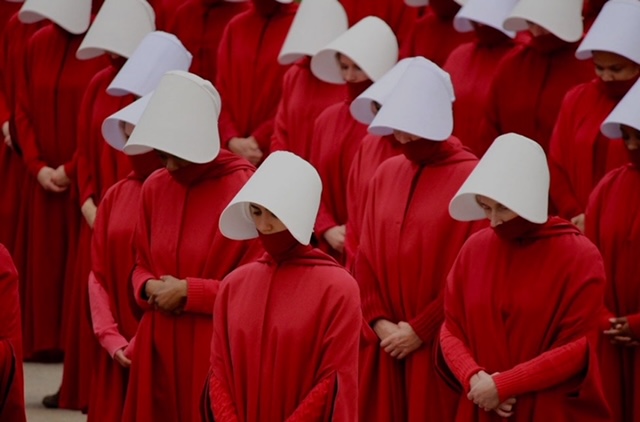
“Povestirea cameristei” este un roman distopic al autoarei canadiane Margaret Atwood, publicat pentru prima dată în 1985. Povestea este plasată într-o societate totalitară din viitorul apropiat numită Republica Gilead, care a înlocuit Statele Unite. Acest regim este întemeiat pe subjugarea femeilor, care sunt clasificate în roluri rigide, cu protagonista, Offred, servind ca și cameristă însărcinată cu nașterea copiilor pentru clasa conducătoare.
Republica Gilead este o societate teocratică și totalitară care a apărut ca răspuns la degradarea severă a mediului și la o scădere a natalității. În acest regim, drepturile femeilor sunt în întregime violate și sunt împărțite în clase sociale, cele fertile fiind desemnate ca fiind Cameriste. Cameristele, femei tinere, considerate fertile pînă la proba contrarie, a căror obligație este de a se lăsa pătrunse (sau „fertilizate“, cum se exprimă naratoarea) de acei Comandanți ale căror soții sunt sterpe și, prin aceasta, de a contribui la creșterea natalității.
Naratoarea, și totodată eroina din “Povestirea cameristei”, se numește Offred, ceea ce înseamnă că este (în) proprietatea unui Comandant pe care îl cheamă Fred. Înainte de ascensiunea Gileadului, Offred a trăit o viață normală alături de soțul ei, Luke, și de fiica lor. Societatea era relativ liberă, deși se confrunta tot mai mult cu probleme de mediu și sociale. Pe măsură ce Gilead a preluat puterea, femeile au fost sistematic deposedate de drepturile lor, ceea ce a dus la separarea lui Offred de familia ei și la reeducarea la Centrul Roșu.
Cameristele sunt apreciate doar pentru fertilitatea lor și sunt nevoite să conceapă copii pentru cuplurile de elită care nu pot avea ai lor. Offred trăiește sub supravegherea strictă a Ochilor (poliția secretă) și se confruntă cu pedepse severe pentru orice neascultare.
În ciuda riscurilor, Offred formează o relație clandestină cu Nick, șoferul Comandantului. Nick oferă o conexiune emoțională și intimitate fizică, care altfel îi sunt interzise. Întâlnirile ilicite ale lui Offred cu Nick oferă un scurt răgaz din viața ei apăsătoare.
Comandantul începe s-o cheme pe Offred în biroul său pentru întâlniri private, ceea ce este interzis. El o implică în conversații diverse, joacă Scrabble cu ea și îi permite să citească reviste vechi – luxuri refuzate femeilor din Gilead. Aceste întâlniri o fac pe Offred să pună la îndoială poziția ei și motivele Comandantului. Astfel, Offred află despre un grup secret de rezistență numit Mayday, care lucrează pentru a submina Gilead din interior.
Pe măsură ce regimul își mărește controlul, Ochii vin s-o aresteze pe Offred. Nu este clar dacă sunt acolo pentru a o pedepsi sau pentru a o salva. Nick îi spune să aibă încredere în ei și că fac parte din rezistență. Offred este luată, lăsându-i soarta incertă.
“Povestirea cameristei” a avut un impact profund asupra literaturii și culturii populare, generând numeroase adaptări, inclusiv un serial de televiziune de succes. Explorarea sa de teme precum autoritarismul, opresiunea de gen și rezistența rămâne relevantă, făcându-l o lucrare puternică și de durată de ficțiune distopică. Romanul continuă să fie studiat și discutat pentru portretizarea înfricoșătoare a unei societăți lipsite de libertăți personale și avertizarea împotriva pericolelor ideologiilor extreme.
In English:
The Handmaid’s Tale is a dystopian novel by Canadian author Margaret Atwood, first published in 1985. The story is set in a near-future totalitarian society called the Republic of Gilead, which has replaced the United States. This regime is founded on the subjugation of women, who are categorized into rigid roles, with the protagonist, Offred, serving as a Handmaid tasked with bearing children for the ruling class.
The Republic of Gilead is a theocratic and totalitarian society that has arisen in response to severe environmental degradation and a plummeting birthrate. In this regime, women’s rights are entirely stripped away, and they are divided into classes, with the fertile ones designated as Handmaids. The handmaids, young women, considered fertile until proven otherwise, whose obligation is to allow themselves to be penetrated (or “fertilized”, as the narrator expresses it) by those Commanders whose wives are barren, and thereby contribute to the growth of birth.
The narrator, and also the heroine of “The Handmaid’s Tale”, is called Offred, which means that she is (in) the possession of a Commander named Fred. Before the rise of Gilead, Offred lived a normal life with her husband, Luke, and their daughter. Society was relatively free, though increasingly faced with environmental and social issues. As Gilead took power, women were systematically stripped of their rights, leading to Offred’s separation from her family and re-education at the Red Center.
Handmaids are valued solely for their fertility and are forced to conceive children for elite couples who cannot have their own. Offred lives under the strict watch of the Eyes (secret police) and faces severe punishment for any disobedience.
Despite the risks, Offred forms a clandestine relationship with Nick, the Commander’s chauffeur. Nick provides a semblance of emotional connection and physical intimacy, which are otherwise forbidden to her. Offred’s illicit meetings with Nick offer a brief respite from her oppressive life.
The Commander begins to summon Offred to his study for private meetings, which is forbidden. He engages her in conversations, plays Scrabble with her, and allows her to read old magazines—luxuries denied to women in Gilead. These meetings make Offred question her position and the Commander’s motives. Thus, Offred learns of a secret resistance group called Mayday, which is working to undermine Gilead from within.
As the regime tightens its grip, the Eyes come to arrest Offred. It is unclear whether they are there to punish her or rescue her. Nick tells her to trust them and that they are part of the resistance. Offred is taken away, leaving her fate uncertain.
The Handmaid’s Tale has had a profound impact on literature and popular culture, spawning numerous adaptations, including a successful television series. Its exploration of themes like authoritarianism, gender oppression, and resistance remains relevant, making it a powerful and enduring work of dystopian fiction. The novel continues to be studied and discussed for its chilling portrayal of a society stripped of personal freedoms and its warning against the dangers of extreme ideologies.
